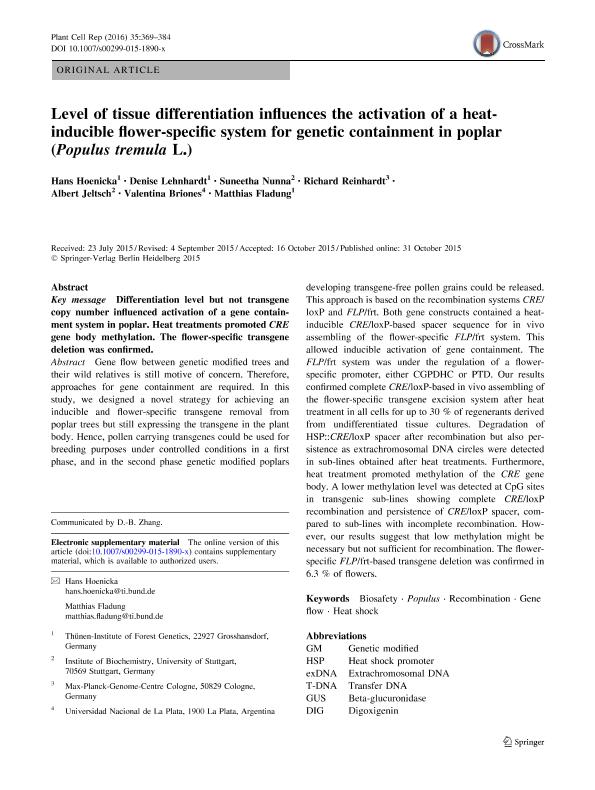Artículo
Level of tissue differentiation influences the activation of a heat-inducible flower-specific system for genetic containment in poplar (Populus tremula L.)
Hoenicka, Hans; Lehnhardt, Denise; Nunna, Suneetha; Reinhardt, Richard; Jeltsch, Albert; Briones, María Valentina ; Fladung, Matthias
; Fladung, Matthias
 ; Fladung, Matthias
; Fladung, Matthias
Fecha de publicación:
02/2016
Editorial:
Springer
Revista:
Plant Cell Reports
ISSN:
0721-7714
e-ISSN:
1432-203X
Idioma:
Inglés
Tipo de recurso:
Artículo publicado
Clasificación temática:
Resumen
Key message: Differentiation level but not transgene copy number influenced activation of a gene containment system in poplar. Heat treatments promotedCREgene body methylation. The flower-specific transgene deletion was confirmed. Abstract: Gene flow between genetic modified trees and their wild relatives is still motive of concern. Therefore, approaches for gene containment are required. In this study, we designed a novel strategy for achieving an inducible and flower-specific transgene removal from poplar trees but still expressing the transgene in the plant body. Hence, pollen carrying transgenes could be used for breeding purposes under controlled conditions in a first phase, and in the second phase genetic modified poplars developing transgene-free pollen grains could be released. This approach is based on the recombination systems CRE/loxP and FLP/frt. Both gene constructs contained a heat-inducible CRE/loxP-based spacer sequence for in vivo assembling of the flower-specific FLP/frt system. This allowed inducible activation of gene containment. The FLP/frt system was under the regulation of a flower-specific promoter, either CGPDHC or PTD. Our results confirmed complete CRE/loxP-based in vivo assembling of the flower-specific transgene excision system after heat treatment in all cells for up to 30 % of regenerants derived from undifferentiated tissue cultures. Degradation of HSP::CRE/loxP spacer after recombination but also persistence as extrachromosomal DNA circles were detected in sub-lines obtained after heat treatments. Furthermore, heat treatment promoted methylation of the CRE gene body. A lower methylation level was detected at CpG sites in transgenic sub-lines showing complete CRE/loxP recombination and persistence of CRE/loxP spacer, compared to sub-lines with incomplete recombination. However, our results suggest that low methylation might be necessary but not sufficient for recombination. The flower-specific FLP/frt-based transgene deletion was confirmed in 6.3 % of flowers.
Palabras clave:
Biosafety
,
Gene Flow
,
Heat Shock
,
Populus
,
Recombination
Archivos asociados
Licencia
Identificadores
Colecciones
Articulos(CCT - LA PLATA)
Articulos de CTRO.CIENTIFICO TECNOL.CONICET - LA PLATA
Articulos de CTRO.CIENTIFICO TECNOL.CONICET - LA PLATA
Citación
Hoenicka, Hans; Lehnhardt, Denise; Nunna, Suneetha; Reinhardt, Richard; Jeltsch, Albert; et al.; Level of tissue differentiation influences the activation of a heat-inducible flower-specific system for genetic containment in poplar (Populus tremula L.); Springer; Plant Cell Reports; 35; 2; 2-2016; 369-384
Compartir
Altmétricas



